Scouts and the 1956 Olympic Games (2)
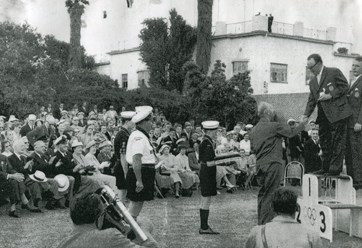 On Games Opening Day, November 22nd a ‘Results Room’ was established at the Village as and the results were received on the teleprinters direct from the venues, a party of six Scouts delivered them immediately to the Areas concerned and to the Public Address room for immediate announcement.
On Games Opening Day, November 22nd a ‘Results Room’ was established at the Village as and the results were received on the teleprinters direct from the venues, a party of six Scouts delivered them immediately to the Areas concerned and to the Public Address room for immediate announcement.
Bilingual Scouts were usually allocated to Areas where the language was familiar, i.e., four Melbourne Scouts speaking Hungarian and German were allocated to the area where teams speaking these languages were housed. Similarly, Estonian, and Latvian speaking Scouts working in the Russian area and their services were greatly valued there as many members of the Russian team spoke these languages.
One of the services performed by many senior Scouts was to conduct parties of VIPs around the Village and these included tourists from USA and Asia.
Scouts working at the Village were allowed two days off from school and their stint included a Saturday or a Sunday. They had their midday meal at one of the dining rooms before the athletes, and it was observed that they were also regular patrons at the Milo and Nescafe stall!
For the purpose of organising an internal distribution round to the Chefs de Mission of the 67 nations represented, the Village was divided into six areas. A central HQ was established with several distribution boxes corresponding to those areas. The Scouts were allocated to the Area Supervisor of each of these areas daily and an HQ patrol delivered to the Patrol Leader in those areas the letters, parcels, packages etc. for distribution.
Later the Scouts took over the distribution of messages for the internal Administration, and patrols were allocated to various offices for these duties.
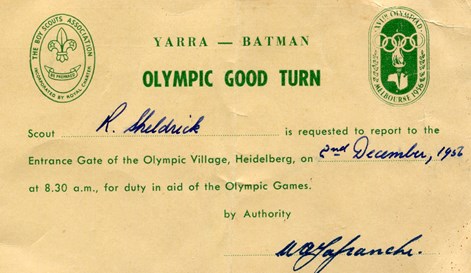
As the internal distribution round necessitated a visit to each Chief de Mission and this happened some ten or fifteens times daily, it was seen that the number of messages, letters, etc. actually delivered was about 1,000 daily, apart from the Administration messages. On one day alone, a total of about 25,000 aerogramme letter forms were delivered based on four for each athlete.
Nearly all the Scouts came from the metropolitan area of Melbourne or from Ballarat (where the rowing and canoeing events were held), but in order to make this at least a token effort of Australia, fifty scouts from other States were invited to participate. Some Groups and Districts insisted that only Queen’s Scouts could attend. Others travelled up to 3,000 miles to attend, and all States of Australia were represented.
Guides and Scouts were issued with a special Olympic scarf, maroon in colour, and bearing the badge of the XVI Olympiad. This scarf later became the scarf of the 1st Olympic Village Scout Group. Each participating unit of the three organisations received a certificate from the Organising Committee.
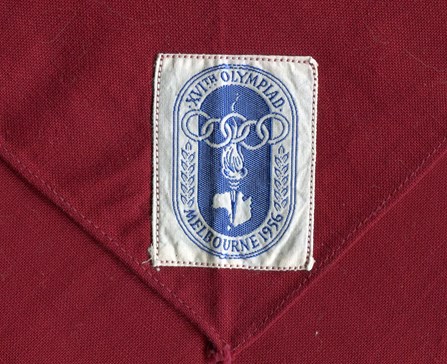
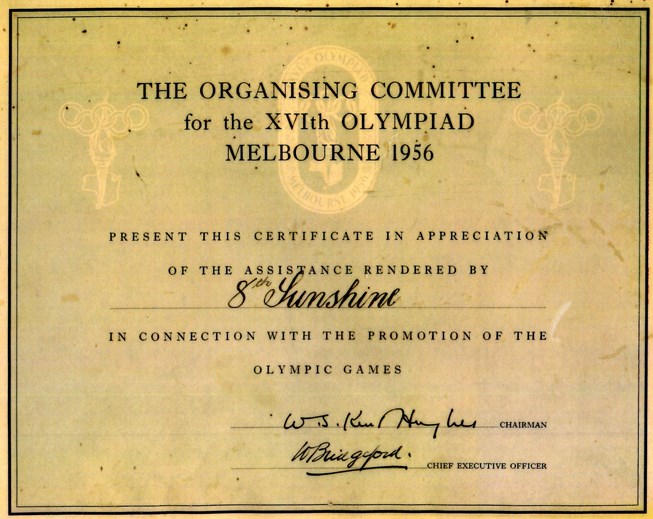
After The Olympics
“THANK YOU, SCOUTS” says 1956 Olympics Chief
In a letter addressed to Mr. Frank R.G. Sanders, General Secretary, Boy Scouts Association, Victorian Branch, Sir Wilfred S. Kent Hughes, M.H.R., Chairman of the Organizing Committee for the XVIth Olympiad thanked to Scouts for their involvement.
“Dear Mr. Sanders,
I have already expressed my own gratitude in person to Colonel A.G. Oldham and all members of the Boy Scouts Association for the splendid services they rendered in connection with the Olympic Games.
Before the Organizing Committee is disbanded, I would like to express the warm appreciation of every member of the Committee to Scout Headquarters and all members who so enthusiastically assisted us in making the Games a success.
We trust that all those who volunteered felt that the job was worthwhile, and that each in his own small way contributed to the fund of International goodwill which form the Games themselves.”
Personal Reflections - we were there to assist:
Prahran District were allocated to the fencing competition.
This was held at the St Kilda Town hall and the Scouts were rostered through various jobs.
- Carrying the medals on a cushion
- Directing people to where they wanted to go.
- Sitting with the judges to carry any messages (no mobile phones or radios in those days).
“We were all issued with a special Scout Scarf, with an Olympic badge on it.
My most memorable time was sitting at the judges table while the fencing finals were taking place. The finals were between three competitors and after each competitor had played each of the others the results were tallied to find the three winning medallists. However, for three sets in a row they defeated each other in turn and the judges had to have them play off again. So, I had to sit there while these three experts fought with fencing foils.
For a 12-year-old Scout this was wonderful. After the first round I was told to come away so I could carry the medals, but I ignored the instruction and sat and watched all three rounds until they finally got a winner. What a day.
Afterwards we all got a day pass to the MCG to watch the athletics.”
David Stidston -2nd Prahran
***************************************
I volunteered my services as a Scout Leader to assist in the Olympic Village. The position allocated to me was at the Communications Centre to enable in and out communications to be channelled correctly. The athletes were billeted at the Village in housing commissioner type homes. There were telephones connected to these houses, so any information coming in was received at a central point to be distributed to the residences of the various countries using Scouts as couriers.
My task was to receive the correspondence and to ensure the correct receiver. The location was verified and then allocated to a Scout to deliver and wait for a reply if required. The range of correspondence coming through the Communication Centre was many and varied.”
Don Barry – ASM 3rd Northcote
***************************************
“I was able to attend three events as a Scout volunteer. This picture of me at the MCG Athletics shows me on the boundary with the medals. Two other Scouts did the actual carrying on a cushion to the presentation dais.
My enduring memory of the Games was an Indian hockey player opening a bottle of soft drink with his teeth!”
Geoffrey Dean – Scout Heritage
***************************************
“Being a 20-year-old mobile Rover at a time, when our District Commissioner – Ralph Schutt circulated a request for communications support, I was able to receive an opportunity during my Naval Dockyard apprenticeship to become a dispatch rider.
My duties were to pick up parcels, telegrams & urgent messages to and from various postal drop off points / communications centres, delivering through, and also out the Olympic Village.
Fortunately in those days when riding a motorcycle, we were able to cover our Scout uniform with a canvas lap rug, so the wind didn’t blow up one’s shorts!
It certainly was a lifetime experience and an honour to meet and greet my favourite athlete, Emil Zatopeck (the Czechoslovak long distance runner) out and about on his favourite training track along the Merri Creek. After a short period of watching, we finally were able to acknowledge each other".
Ian Sharpe - Honorary Commissioner and former Port Phillip Sea Rover
***************************************
References:
Nation with Nation – XVI Olympiad Melbourne 1956, Official Report
The Victorian Scout, P9, April 1957
Photos and Euphemia: Scout Heritage Victoria Collection
This article is in a series of Victorian Scouting History published by Scout Heritage Victoria
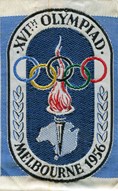
Caption
With the Tokyo Olympic Games due to commence on July 23rd 2021, we remember the great contributions made by Scouts and Guides in 1956.
The 1956 Olympic Games were held in Melbourne and the many volunteers needed to assist in the Youth Organization of the Games through the medium of Boy Scouts and Girl Guides and members of the Air Training Corps.
Some 250 Girl Guides volunteered for a service controlled by Miss C Broadhurst, Training Adviser for Victoria. This service was chiefly for the women athletes at the Olympic Village – bed making, laundry, shopping and acting as guides to athletes and official visitors to the Olympic Village.
The Boy Scouts Association, whose Deputy Chief Commissioner, Colonel A.G. ‘Tops’ Oldham, acted as co-ordinator of the Youth Organization, put 3,500 members into “The Olympic Good Turn”. This service commenced as early as November 1955 and in general, Districts were asked to provide services at various venues and special sections. The scouts paid their own fares but were given meals whenever practicable. Volunteers were expected to give at least two days; most made themselves available for much longer periods. The first Scouts were rostered at the Olympic Village in West Heidelberg six weeks before the Games began. Eventually, while the Games were in progress, 500 Scouts were on duty every day.
They were chiefly employed as messengers and their services used by Arena Managers as assistant ushers, parking attendants for official cars, adding-machine operators and in the appropriate venues, performed such special functions such as holding medal presentation cushions (of green and gold), keeping canoes in position, or replacing obstacles in the modern pentathlon.
Scouts were on duty at 90% of the venues. In every case, the Arena Managers expressed the greatest satisfaction with their work; in fact, as the Games progressed, all asked for more Scouts.
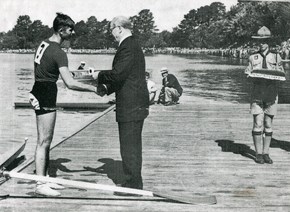
Caption
The following are some of the duties allocated to the Scouts: -
- Opening the door of the car of the Duke of Edinburgh when he arrived at various functions
- Collection of medals and distribution to the arena and to the point where the Victory Ceremony was held
- Assisting in the section responsible for the reception of distinguished visitors.
Acting as guides for the Sporting Federation Congresses at the University of Melbourne - Assisting lost children taken by police to various points near the arenas. Rovers were responsible for getting them to the railway station or to depots established in the city until parents could be contacted, usually over the radio.
- Assisting at St. John Ambulance First-Aid posts
- Receiving and distributing results from other venues at the main stadium
- Assisting operators of the film units in caring for their gear and taking exposed film to waiting motor cycles outside the venue for despatch
- In the operation of the Omega timing clock.
As the Village organisation reached its peak, more and more calls were made for the services of Scouts. Finally, in addition to the normal allocation of 24 Scouts to the ‘Areas’ each morning, the round included the Canteen, Catering, Reception, Enquiries, Sewing Centre, Paymaster, Medical, Security – employing all the 54-60 Scouts reporting daily.
Later an additional messenger system was adopted whereby any team could contact HQ for a messenger. The teams mostly using this system were Kenya, France, Great Britain and Northern Ireland, Poland, Japan, Israel, and Burma. According to the Scouts’ report, the calls under this system were many and varied ‘from the distribution of 10 tons of firewood to individual houses during a cold spell, to the use of a small Scout to dislodge a thoroughly frightened bird from a chimney in the French team’s quarters and finally, a large gentleman, with a walking stick, was needed to dislodge the Scout!’
On Games Opening Day, November 22nd a ‘Results Room’ was established at the Village as and the results were received on the teleprinters direct from the venues, a party of six Scouts delivered them immediately to the Areas concerned and to the Public Address room for immediate announcement.
Bilingual Scouts were usually allocated to Areas where the language was familiar, i.e., four Melbourne Scouts speaking Hungarian and German were allocated to the area where teams speaking these languages were housed. Similarly, Estonian, and Latvian speaking Scouts working in the Russian area and their services were greatly valued there as many members of the Russian team spoke these languages.
One of the services performed by many senior Scouts was to conduct parties of VIPs around the Village and these included tourists from USA and Asia.
 Caption
Caption
